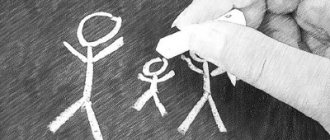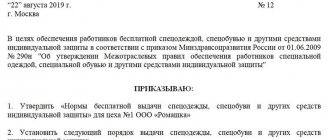Pedagogical characteristics for a kindergarten student for PMPK
The girl’s adaptation was quick and quite easy. Absent from kindergarten very rarely, mainly for other reasons. The girl goes to kindergarten eagerly, without tears. The girl is always neatly dressed and takes care of her appearance. Physical development: The girl has difficulty jumping and running. Self-service skills are fully developed. He doesn’t like to dress and undress on his own and is lazy. The girl is affectionate and kind, she knows the rules of behavior, but if something doesn’t go the way she wants, she can go to a quiet place and sit there until the teachers come to her. She loves to be hugged and shows a friendly attitude towards others. Reacts adequately to evaluation of completed tasks. If difficulties are encountered, he asks for help and strives to complete the task to the end.
Difficulties are observed in speech development classes. The girl answers questions, but not clearly, cannot clearly tell or retell the fairy tale she has studied, her speech consists of simple sentences. The girl has difficulty writing stories; cannot identify the first sound in a word; finds it difficult even with the help of an adult to repeat examples of descriptions of the toy; does not accompany its activities with speech. For the holidays, the Girl learns short poems, but she can’t tell them clearly. The girl also replaces words that are more difficult for her with easier ones: dog - woof-woof, shoes - tops, children - lyali, eat - yum-yum, etc.; looks at the illustrations of children's books with interest, expresses his desire to listen to a certain literary work.
Download:
In writing and reading - can copy from the board, printed cards; copies sentences, short stories, can independently divide words into syllables, carry out word hyphenation; gives characteristics of consonant sounds; reads, reading technique is very low; he memorizes poems and immediately forgets them; retells texts, answers questions about the content.
Preview:
By counting - mastered ordinal and quantitative, reverse and pairs counting within 10; knows and recognizes numbers, writes them in a notebook; correlates numbers with the number of objects, understands the relationship between numbers within 10; establishes equality and inequality of groups of objects; knows geometric shapes and sees them in the forms of the environment; correctly names the parts of the day, knows the seasons, distinguishes between time concepts; recognizes right and left hands, indicates in words the position of an object in relation to itself; Performs counting operations with numbers using an abacus.
The boy arrived at our school with a bad habit - smoking and was registered with the traffic police inspector. But thanks to correctional and educational work, establishing control over activities and social circles, positive dynamics are observed in behavior. A. is trying to be more restrained, quit smoking, and joined a sports section. The boy is sociable and makes contact easily. Relations with children in the group are uneven, the nature of the connections is selective. He can mock and offend weaker children, or he can offer his help in completing assignments during preparation. He never admits his guilt and tries to shift it onto someone else. When communicating with adults, he tries to be polite, but can have a negative attitude towards comments and be rude. He tries to fulfill the demands of adults.
Labor skills have been developed. Treats socially useful work conscientiously. Performs all instructions from adults efficiently and independently. The boy has no desire to voluntarily participate in public affairs. Personal and school property is not always treated with care. Possesses sanitary and hygienic skills. He takes care of his appearance.
A. entered the Betlitsa boarding school on September 09, 2016 from the State Educational Institution for Orphans and Children Without Parental Care “Azarovsky Orphanage named after V.T. Popov.” Currently, the boy has completed his studies in 7a grade.
(full name of the student),
... year of birth, entered
(institution)
on September 1 ... year.
Previously lived at the address: (address).
Mother:
(mother’s full name)
, ... year of birth.
Father: (father's full name)
, ... year of birth.
Deprived of parental rights due to... There is another child in the family aged . (indicate the child's age).
A teenager has a limited outlook, situational mental actions, which are determined either by the objective environment or by direct instructions from an adult, an undeveloped imagination, and a lack of purposefulness.
(student's name)
has the temperament of a sanguine person with certain qualities of a choleric person, and constantly experiences a craving for communication with other teenagers and for new experiences. The boy is characterized by emotional instability when failures and troubles occur. The main disadvantage is excessive impulsiveness and the inability to restrain one’s emotions when communicating with peers.
Communication sphere: friendly, open, easily establishes contact, but is not inclined to communicate in a wide circle, preferring individual activities. The style of communication with others is non-dominant - compliant, easily admits being wrong, needs support when talking. Accepted by the team.
As a result of the psychodiagnostic measures carried out, the following was established: the current level of psychological state does not correspond to the norm, there are minor violations of certain mental functions.
You might be interested ==> Living wage for a teenager in Rostov-on-Don in 2021
Volitional sphere: volitional regulation is insufficiently developed, often does not complete the task, is fickle, insufficiently collected, lacks strong educational motivation, is not responsible enough, may neglect responsibilities.
The process of adaptation in kindergarten was quite easy: the child did not cry when parting with his parents, showed interest in the group room and his peers, and from the first days had lunch and stayed to sleep. The child has been attending kindergarten for three years. He attends kindergarten with great desire.
Behavior does not correspond to age standards and is a serious obstacle to its full inclusion in the educational process (activity)
He is impulsive, overly active and restless.
In class he cannot sit still and often disturbs his peers, committing rash and sometimes dangerous actions. Easily distracted by extraneous stimuli, does not follow work in class, often answers the teacher’s questions without thinking, and has difficulty maintaining attention when completing assignments. Behavioral characteristics affect the level of mastery of the educational program of a preschool educational institution. During educational activities, for a child to cope with tasks, since he has low performance capacity and experiences difficulties in organizing and completing work.
Behavioral disorders in a child also affect his relationships with peers. Due to his intolerance and easy excitability, he often comes into conflict with peers, cannot play with them for a long time, or establish and maintain friendly relations. Attacks during games, calls obscene names and beats children, takes away toys. Sometimes, for no apparent reason, he begins to kick and hurt the child , swings his arms and hits him first. When talking with the teacher or preschool employees, the child deliberately uses rude expressions, although he understands that this should not be done.
But thanks to correctional and educational work, establishing control over activities and social circles, positive dynamics are observed in behavior. A. is trying to be more restrained, quit smoking, and joined a sports section.
Characteristics of a pupil of an orphanage (9th grade)
The girl arrived at the Krasnokamensk orphanage on January 1, 2008 from the “Solnyshko” orphanage in the city of Krasnokamensk. She previously lived in the village of Soktuy-Milozan. Currently, the girl is studying in 9th grade at secondary school No. 10. . Until 2009, she studied at Secondary School No. 2, then was transferred to Secondary School No. 11, due to the fact that the girl did not master the general education school curriculum. Now the girl’s educational activities are formed at the proper level. Diligence in educational activities is good. The girl has difficulty completing assignments in the Russian language and makes mistakes in spelling unstressed vowels, voiceless and voiced consonants. There are difficulties in memorizing text and retelling works. In mathematics, he has difficulty solving problems: he does not know how to correctly find solutions. Now the girl counts well. I began to write legibly, more calligraphically. Additional classes and error analysis yielded results. Completes homework conscientiously. There was order in the notebooks and in the diary. We can say that the girl’s educational activity has developed, but since the girl’s vocabulary is poor and her active vocabulary is not large, it is therefore necessary to continue work in this regard. Invite her to read more books from the library. Vika enjoys drawing and enjoys attending the Fashion Theater, Smak, and football clubs. She is very active and takes part in all activities both at school and at home. Good acting skills. The girl is efficient, sociable and friendly, so she has no problems with her peers and with adults. Relations with everyone are smooth.
He is friends with a girl from his own group. He tries to spend most of his time at home doing some kind of activity. With peers and children younger than himself, he behaves kindly. Does not occupy leadership positions in the group's team.
Positive testimonial for a child at an orphanage
per pupil: - social status, - academic performance Sample characteristics for pupils (speech skills). by Molly | Category: Methodological developments » Other sample characteristics for a trainee Sample characteristics for a leader Sample characteristics for a school graduate Sample characteristics for a kindergarten teacher Other sample characteristics October 09, 2021 Popular samples and document templates
- the child is excited, cannot concentrate, exhibits a refusal reaction, irritable to the point of hysteria, cannot make contact; - shows excessive familiarity and sloppiness. Everything is swept away from the table, the activity is not purposeful, chaotic, impulsive, it is not possible to include it in the activity; - does not enter into emotional contact and cooperation, remains silent.
Organizational aspects
The document is prepared with the participation of a psychologist, speech therapist and teacher. A ready-made description of a kindergarten student is provided for:
The pedagogical characteristics of a preschool educational institution student is an official document that is invalid without the signature of all persons filling out the form. The seal and signature of the head of the institution is also required.
Approximate characteristics for an orphanage pupil
The child mastered the program for the junior group of kindergarten at a level below the age norm. Self-care skills are not sufficiently developed: he cannot dress himself, eats selectively, and often refuses food. During classes, he accepts the learning task selectively, has difficulty understanding simple monosyllabic instructions, and when working with handouts, the child is often distracted and begins to play (construct from it). He can count, but cannot remember numbers. Has no idea about the relationship between numbers and quantity. In speech development classes, the answers are unclear. It is difficult to perceive assigned tasks, does not remember the sequence of actions well, and copies the behavior of hyperactive children.
FULL NAME. selects games by age. Loves to build a variety of buildings using all types of construction kits. He chooses quiet games, avoids noisy group games, and likes to study alone. In collective games he takes the position of a follower. Guys love to play with him and often involve him in role-playing games, but it is difficult for him to cope with the assigned role. The child easily switches from one type of activity to another and is able to complete the game without the help of a teacher.
Preview:
In conclusion, the author should briefly formulate his opinion about the child. If the baby is healthy and fully developed, and his living conditions do not cause concern, general information is sufficient. If there are deviations, the characteristic should be as detailed as possible.
On the topic: methodological developments, presentations and notes
Apr 29, 2021 semeiadvo 151
Share this post
- Similar posts How to pay for non-exclusive rights in 2021
- A group 2 disabled person's accounts have been frozen
- GKP cost
- Is it possible to get a certificate for housing based on Chernobyl in Bryansk
Sample characteristics for a child from a kindergarten teacher
- Social information about a minor. This paragraph should include all information about the child’s family. If possible, indicate family relationships. If there are diseases among relatives that may carry a genetic predisposition, this type of information is also indicated. Material assessment of the family in which the pupil lives.
- The play activity of the pupil also plays a role in drawing up the document, since the child, especially in the first years of life, shows most of his emotions in a playful form. At this point, you should describe how the child manifests himself in logic games. How friendly he can be in group games. The student’s desire to demonstrate leadership abilities.
Peculiarities of pedagogical assessment of a student. This paragraph provides information on the student’s mastery of all the basics of everyday activities. The predisposition and skills of the minor in any particular direction are indicated. The degree of perception of information that the student receives during classes. Perseverance and ability to listen to the teacher.
- conduct observation of the pupil in his natural environment;
- conduct testing in various fields of activity, which will identify predisposition to a particular occupation;
- When drawing up a document, you should not indicate information without good reason. In this type of document, educators' assumptions cannot be used;
- through communication with the pupil’s parents and relatives, find out who is the priority for the child;
- Using psychological tests and conversations, identify the state of the atmosphere in the family circle and how it affects the student.
Rationale for social work with street children from an orphanage
Neglect and homelessness as a social phenomenon. Historical analysis of the problem of neglect and homelessness in Russia. Areas of social work for the prevention of neglect and delinquency among minors in the Yaroslavl region.
The essence and content of the concept of “gifted children”. State support for gifted children. Regulatory basis for the implementation of social work with gifted children. Basic forms and methods of working with gifted children. Social work with families.
STATEMENT OF CLAIM ->
_____________'s cognitive interests and curiosity are formed at an average level. The girl answers only when called by the teacher. Attention is easily attracted, but unstable, and it is not always easy to switch from one type of activity to another. The level of visual, holistic perception, and practical orientation to form is normal. Visual-figurative thinking is below normal. The ability to compare and understand the dynamic change of an event has not been developed. Visual memory predominates, the girl remembers numbers better. Situations with hidden meaning (proverbs) cannot be explained. He does not turn to an adult for help, prefers a wait-and-see attitude.
Residence address: Severoyuzhsk, st. Korovogrivova, 33, apt. 2 tel. in a dormitory from ZAO Gazpromchik. Only one room of 20 sq.m. is allocated for the whole family. Which is not conducive to quiet studies, reading books and doing homework.
To help a novice orphanage teacher
A teacher in an orphanage is the most important person, because he is responsible for everything that happens in his group. Children’s behavior, studies, cleanliness, organization of leisure time, correctional work - this is an incomplete list of the key areas of a teacher’s work. And in addition to responsibility for the life and health of children, the educator also has an incommensurably greater responsibility for the souls of children (this is what distinguishes him from a good prison guard).
We had a case when one of the groups changed 5 teachers over the course of three years. How much work it took us a few years to get these children in order. There were teachers who worked in the orphanage literally for one day and quit, unable to withstand the stress. And how difficult it was to organize this first meeting with the children, with what anticipation the children’s eyes shone.
Social work with children in a social shelter
The main goal of such institutions is to teach the child to live in the current social conditions, to restore his health and psychological stability. Conditions similar to those at home are created for children. Together with the guardianship and trusteeship authorities, documents are collected and personal files of pupils are processed and measures are taken to decide their future fate.
In a difficult situation, any child at any time of the day can come to the shelter and ask for asylum. He can also leave here voluntarily. But usually the children return here on their own. At the shelter, a disadvantaged child receives pre-medical care, clothing, and food. It is also humane that he is not deprived of his usual environment and can attend his own school, make friends with his old friends, and receive treatment at a local clinic.
Sample characteristics of a pupil of the SRC
Identifies the interests and needs, difficulties and problems, conflict situations, deviations in the behavior of pupils and provides them with social assistance and support. 2. Acts as an intermediary between students and the institution, organization, family, environment, specialists of various social services, departments and administrative bodies.
General methods and content of the work of a social teacher in an orphanage. sample characteristics of a group, sample characteristics of a sports school student with a photo, example characteristics of a preschooler girl, sample characteristics of a child in a camp, sample characteristics of a child from a kindergarten.
Organizational aspects
The document is prepared with the participation of a psychologist, speech therapist and teacher. A ready-made description of a kindergarten student is provided for:
- Admission to school.
- Solutions to legal issues.
- Consultations with a psychiatrist.
- Commissions for transfer to a speech therapy group or specialized educational institution.
- Children with disabilities who attend kindergarten.
- Guardianship and trusteeship authorities.
The pedagogical characteristics of a preschool educational institution student is an official document that is invalid without the signature of all persons filling out the form. The seal and signature of the head of the institution is also required.
Approximate characteristics of a child
A child from a complete family. Relationships with parents are built on a warm, friendly basis. In a family, the child communicates most with his mother. At home he prefers to draw, play checkers, draw, and lego. He readily responds to his mother’s offers to help with cleaning the house. Places toys independently.
Social skills are age appropriate. The child can independently use toiletries, wash his face, wash his hands, comb his hair, can dress, undress, put on his shoes, and use a spoon independently. The boy is aware of his physical capabilities. Aware of himself in time and space.
Sokolova Yulia Anatolevna
Research by domestic and foreign psychologists notes the important role of adolescence in the formation and development of personality. At this age, the development of reflection, the formation of self-awareness, the “sense of adulthood” occurs (L.S. Vygotsky, L.I. Bozhovich, D.I. Feldshtein, D.B. Elkonin, T.V. Dragunova, etc.), the prerequisites are created for the emergence of the meaning of life, the discovery of one’s self, the formation of personality, on the one hand, and the formation of a worldview, on the other (V.E. Chudnovsky); the opportunity arises for a deeper and broader understanding of other people (L.S. Vygotsky), the teenager becomes the object of his research; the experience of realizing the uniqueness and inimitability of one’s personality arises, that is, the inner world and belief in uniqueness acquire greater significance
This is interesting: Power of attorney to receive f 7 and f9
In the modern social situation, an increasing number of adolescents are being raised outside the family. Meanwhile, according to I.V. Dubrovina, V.S. Mukhina, A.M. Prikhozhan, A.G. Ruzskoy, N.N. Tolstykh, children deprived of parental care have multiple disorders in personality development. But these studies were devoted to disorders in the personality development of children in orphanages. Children from the orphanage have not been studied enough. Compared to children from orphanages, they have experience of living in a family and many of them return from the orphanage to their families. Relations with parents may continue or may be terminated (due to deprivation of their parental rights). The personality characteristics of a child from an orphanage have not been studied enough.








